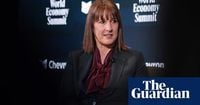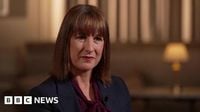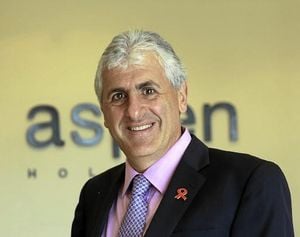Chancellor Rachel Reeves has laid out firm red lines for a potential trade deal with the United States, emphasizing that Britain will not compromise on its food and online safety standards. Speaking ahead of crucial negotiations in Washington, D.C., on April 23, 2025, Reeves reiterated that the safety of children and the integrity of British food standards are non-negotiable.
During an interview with Sky News, Reeves expressed confidence in reaching a deal but made it clear that the UK would not lower its regulatory standards in exchange for trade concessions. "On food standards, we've always been really clear that we're not going to be watering down standards in the UK," she stated. This assertion comes as the US administration continues to push for the UK to relax its rules on agricultural exports, particularly concerning hormone-treated beef.
The UK currently faces a broader tariff rate of 10% on various exports to the US, while American car imports are subject to a hefty 25% tariff. In a bid to foster a more favorable trading relationship, the UK is considering reducing its automotive tariff from 10% to 2.5%, a move that could significantly impact the automotive sector.
Reeves, who is meeting with US Treasury Secretary Scott Bessent, highlighted the importance of not rushing into a deal. She stated, "It's important that we get the right deal for Britain, that we don't rush into a deal, but we do the right deal in our British national interest." This cautious approach comes amid warnings from car manufacturers about potential job losses if a deal is not secured soon.
In her Mansion House speech last November, Reeves mentioned that post-2008 reforms had "gone too far," indicating a willingness to discuss deregulation in the City of London. However, she remains firm on maintaining high food and safety standards. "We are not going to be relaxing our food standards. We have high standards to support British farming and support British consumers," she emphasized.
The Chancellor’s comments reflect a growing tension between the UK and US over agricultural practices. Many American farmers utilize growth hormones in beef production, a practice banned in the UK since the 1980s. Reeves stated that British farmers have warned against diluting food standards, and the government is committed to upholding these regulations.
Moreover, the UK has signaled its openness to relaxing certain regulatory barriers in financial services, with Reeves suggesting that regulators should balance risk with growth. This comes as Britain grapples with rising borrowing costs, which have reached their highest level in nearly 30 years, largely due to US trade policies that have impacted UK bond yields.
Reeves’ remarks coincide with a document circulated among US business groups that outlined the US's desire to lower tariffs on UK goods, particularly cars. US Vice-President JD Vance has expressed optimism about the possibility of a trade deal, stating there is a "good chance" of reaching an agreement.
However, the Chancellor remains cautious, stating, "We are not going to rush into a deal. We want to get the right deal that’s in our national interest, and those talks are ongoing." This sentiment reflects the complex nature of the negotiations, particularly as the UK seeks to protect its agricultural standards while also addressing the pressing need to mitigate the impact of tariffs imposed by the Trump administration.
In addition to food and safety standards, Reeves has also indicated that discussions will include the need for a technology partnership that builds on the existing security and defense relationship between the two nations. She noted, "This isn’t just about damage limitation; it’s also about what the next step is." This forward-looking approach aims to enhance economic ties and drive investment in both countries.
As the UK continues to navigate the intricacies of its trade relationship with the US, the Chancellor has also announced a review of low-value imports to prevent UK retailers from being undercut by cheaper foreign goods. This move aims to bolster British businesses against the backdrop of a global trading environment that has been increasingly characterized by tariffs and trade wars.
Reeves' commitment to maintaining high standards in food safety and online regulations has been met with support from various sectors in the UK. However, some critics argue that the government should act more swiftly in its negotiations with the US to alleviate the economic pressures facing British industries.
The Chancellor’s visit to Washington comes at a critical time, as the UK grapples with economic challenges exacerbated by global trade tensions. With the International Monetary Fund (IMF) recently downgrading the UK's growth forecasts, Reeves faces mounting pressure to secure a favorable trade deal that will support jobs and investment in the UK.
As discussions continue, both sides remain hopeful that a mutually beneficial agreement can be reached. However, the Chancellor’s insistence on non-negotiable standards reflects a commitment to uphold the values that define British regulatory practices, even in the face of significant economic pressure.
In conclusion, as negotiations progress, the UK government remains steadfast in its commitment to maintaining high standards while seeking to foster a more favorable trading environment with the US. The outcome of these discussions will have significant implications for the future of UK-US trade relations and the broader economic landscape.






